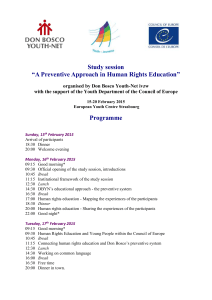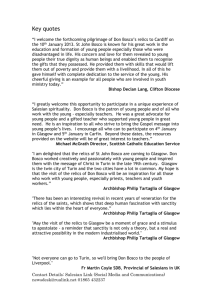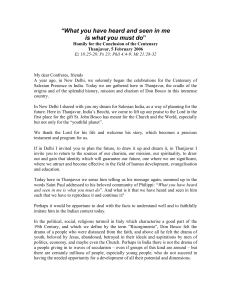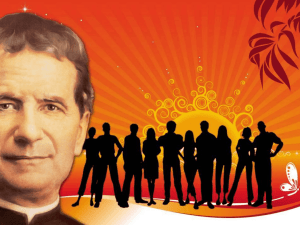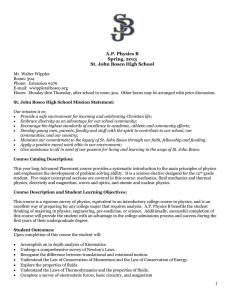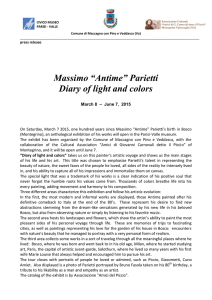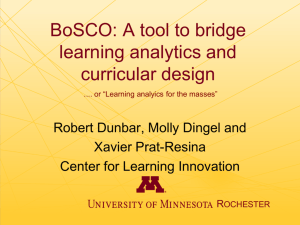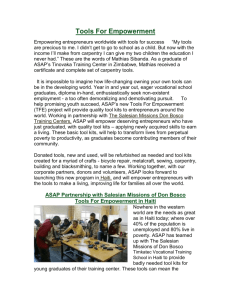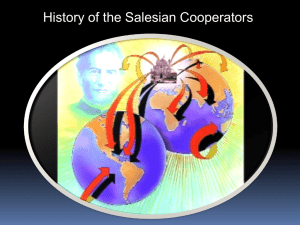PPT Don Bosco Teenage Care - Don Bosco Youth-Net
advertisement
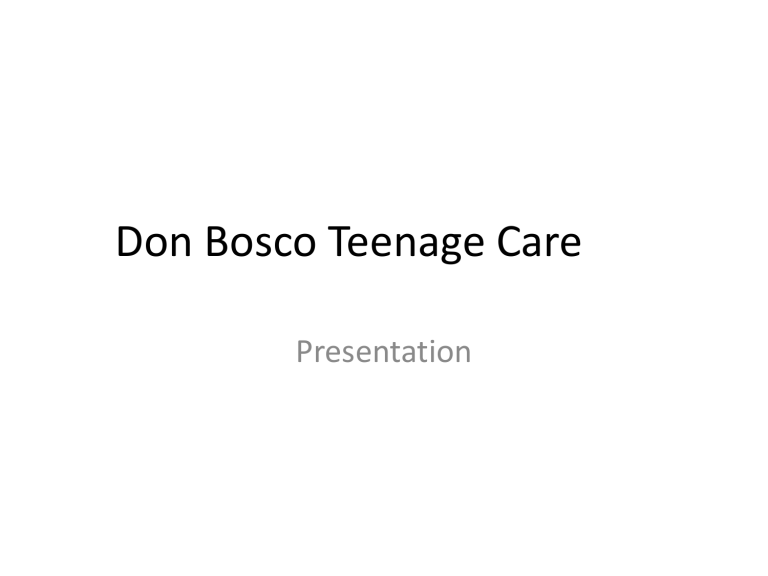
Don Bosco Teenage Care Presentation Principles Which we live and work…… The Young Person First “The young must not only be loved, they must be able to feel they are loved” (Don Bosco) We place the young person at the heart of the Don Bosco community, empowering and enabling them to grow towards their innate potential Salesian Ethos Approach Therapeutic Community Approach Proactive Presenc Opportunity Led Work ‘Every staff member should make a point of getting to know the young people in their care, of informing themselves of their previous history and should show themselves to be their friend’ (Don Bosco) “The relationship provides the very fabric of the community, creating a culture of open exchanges, questioning, debate and enquiry concerning personal experiences so vital to the recovery and development of extremely troubled young people”. Ward,(2007) We engage with each young person from the moment they enter our care, getting to know them, building on their interests, engaging them in activities and games, inviting them into a relationship of trust while recognising and planning for the challenges this brings Family Spirit ‘Young people are the most precious yet vulnerable part of society’ (Don Bosco) We try to be emotionally available for young people at all times. We give time and energy to tuning into and trying to understand the young people, so that they may understand themselves. We seek to use daily interactions to create and respond to opportunities to engage with them in ways that promote healing and growth. Community/ Belonging ‘Everyone has a basic human need to belong, to be in a place where they matter and feel wanted’ We work to make each of our houses a home, a setting which is warm, friendly and respectful, that nurtures a sense of belonging, offers security, builds positive relationships marked by empathy and respect and promotes opportunities for genuine engagement between the young person and those involved in their lives, including their own families as appropriate We strive to help the young person to attach himself to the community so that for the first time he may begin to trust and leave behind any sense of alienation. We use community meetings to involve young people in decisions about the house and their lives. We believe that relationships are at the core of the work in helping young people achieve emotional and personal growth. Reasonableness Participation / Empowerment ‘“Educators should be convinced that young people are intelligent by nature, and can recognise the good that is done to them personally, and at the same time they are gifted with good hearts which are readily open to gratitude” (Don Bosco) ‘Through the responsive process of democratic inclusion the therapeutic community provides an environment in which the young people can begin to rebuild themselves as agents in their own lives and thereafter citizens of the world beyond’ We accept young people as they are. We explain clearly the reasons behind the rules/boundaries, our requests, demands, expectations, motives and plans while respecting the young person and his opinion even when it is different. There is no place here for harsh rules, harsh punishments or threats, even in the face of the most challenging of behaviours. Loving-Kindness ‘The practice of the Salesian Preventive System is all based on the words of , who says,: Love is patient, love is kind...it bears all things…hopes all things…endures all things’ (DonBosco) We believe that open and honest communication is at the heart of the approach taken in our work with the young people and with each other. We actively seek to involve the young people as much as possible in all aspects of living, through consultation, interdependent responsibility for decision making and helping them to take responsibility for their actions Safety / Containment ‘Enabling young people through encouragement, tolerance and support’ We accompany the young people with a love and understanding based on their needs; an acceptance that facilitates the young person’s confidence; a relationship that instils a sense of inward security and supports his growth as a human being and as a faith filled person We establish clear boundaries and limits with a view to enabling the young people to have a sense of order and structure in their lives. This setting enables them to experience their emotional distress as ‘encouraged, tolerated and supported Religious Belief / Faith Therapeutic Process “Jesus says: ‘I have come that you may have life “The therapeutic aim is to enable fragile young and have it to the full” Jn. 6:14 people to develop their capacity to manage themselves in relation to others and to be responsible for their own choices” Tomlinson, We commit ourselves to engaging with the young (2004). person in terms of their spiritual needs and meaning / purpose in life. Don Bosco’s own Christian faith and upbringing in life provided him with the strength and motivation to meet and accept each young person with a loving heart and the gift of hope. Like Don Bosco we take every opportunity to open ourselves to the source of inspiration he found in the person of Jesus as we journey with the young person and his life story. We respect other religions and philosophies of life aware that every human being struggles with the spiritual questions and looks for sources of inspiration. We aim to provide an atmosphere and ethos where change from within can occur. We pay attention not just to the outward behaviours but also to the young person’s inner world. We believe by providing safe nurturing relationships the young person can begin to heal past hurts. Our hope is that this frees them up to grow and develop to their full potential. Attachment is an “affectionate bond between two individuals that endures through space and time and serves to join them emotionally” (Fahlberg, 1999:14). How the Work is Done •Keyworking, with particular reference to the implementation of the individual care plan and placement plan •Opportunity led work •Role Modelling •Community Meetings •Activities and experiences that promote a sense of achievement, developing social skills and a redirecting of their energy into positive channels • Special time • Special food • Referrals to additional services, e.g. psychotherapy, speech and language therapy, addiction counselling • Regular reviews of the care plan with the young person, involving members of his family, his social worker and other professionals
